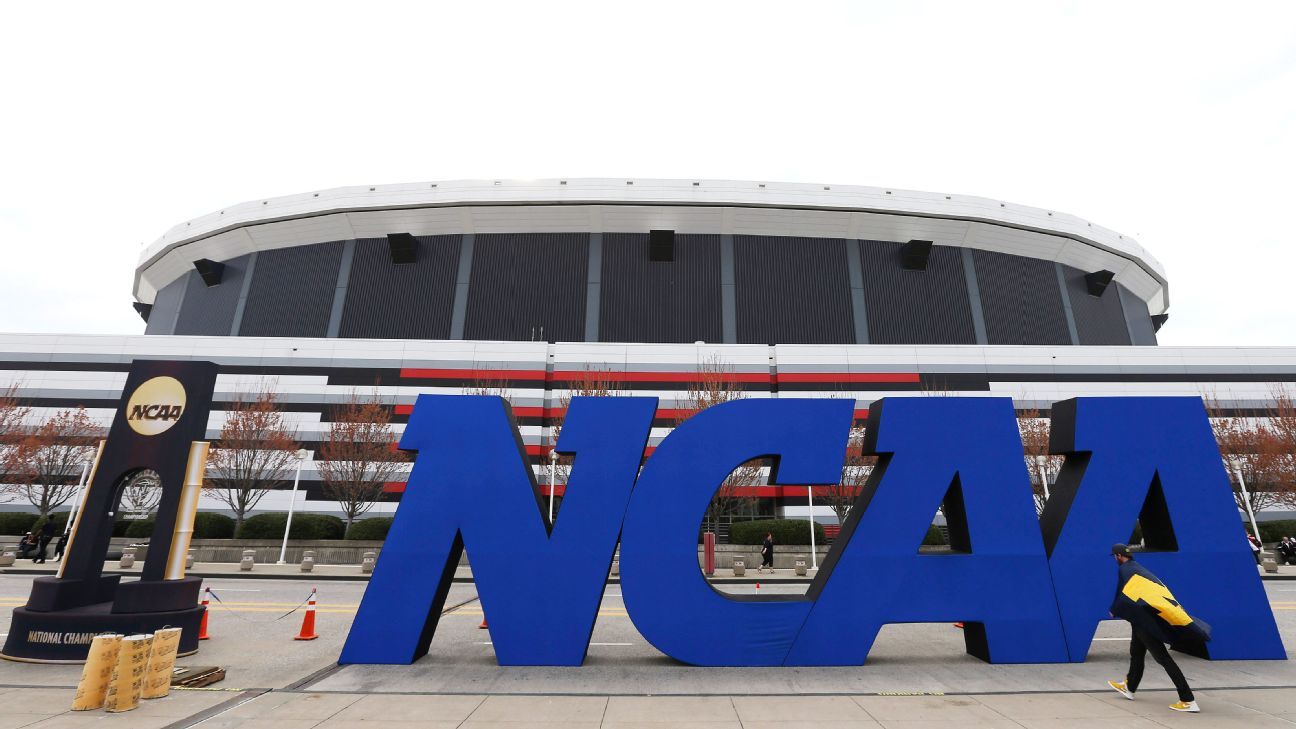The NCAA won’t mandate or oversee a uniform return to college sports, NCAA president Mark Emmert said Tuesday, leaving decisions on start dates to state officials and university presidents.
College athletics came to a halt in mid-March, when the NCAA canceled the men’s and women’s basketball tournaments, along with all remaining winter and spring championships, because of the evolving threat of the coronavirus pandemic. There is still no timetable for a return, and Emmert said it isn’t the NCAA’s role to determine one in this instance.
“Normally, there’s an agreed upon start date for every sport, every season,” Emmert told ESPN, “but under these circumstances, now that’s all been derailed by the pandemic. It won’t be the conferences that can do that, either. It will be the local and state health officials that say whether or not you can open and play football with fans.
“We already saw the Oregon governor offering her views on what’s likely to happen in September. The Pac-12 can say, ‘Gee, we’d all like to open up on this date,’ but whether or not you can is going to be ultimately up to the state and local health officials and the campus itself making a decision whether or not they want to go forward.”
Earlier Tuesday, several Pac-12 football coaches expressed support for an NCAA-mandated uniform start to the season while on a video conference call with reporters. This followed Penn State coach James Franklin’s comments last week that it would be helpful for the NCAA to give some national guidelines in addition to what each state and university determines.
Washington coach Jimmy Lake said Tuesday that he would prefer for all major college teams to begin six weeks of preparation for the season at the same time.
“I’m of the opinion it would be great if the NCAA made a blanket rule for the whole nation of when we would start, and I understand some states may be less hit by this than most. And I’m sure there’s going to be some different opinions on this,” Lake said. “In my opinion, I believe the NCAA should step in and say, ‘OK, here’s the date when everybody can start.'”
Colorado coach Karl Dorrell and Utah’s Kyle Whittingham backed Lake’s pitch, but Emmert’s latest comments appear to throw water on that idea.
“These are localized decisions,” Emmert said Tuesday. “Local campuses have to decide: Are we opening up, and are we bringing students back to play sports? The NCAA doesn’t mandate that, nor should it. The schools themselves have to make those choices.”
Emmert said the NCAA’s decision-making model during the pandemic is similar to that of the federal, state and local governments, and the NCAA’s role is to “provide guidance and support.” The NCAA in March established a COVID-19 advisory panel of leading medical, public health and epidemiology experts and NCAA member schools to guide its response to the outbreak of the coronavirus. NCAA chief medical officer Dr. Brian Hainline leads the group.
“Brian and his committee will advise institutions as best they can, but it’s advice,” Big 12 commissioner Bob Bowlsby said. “They can’t mandate when we go back or determine exactly when that happens. They can just give us the best advice they can provide, based upon scientists and medical information.”
The one championship the NCAA doesn’t oversee is that of college football, which determines its winner through the College Football Playoff. Bowlsby told ESPN that the Football Oversight Committee could play a role in helping determine a start date.
“The Football Oversight Committee will have a role in putting a date on the calendar eventually, to say you can start some sort of return to play on this date, but that may be on three days’ notice,” Bowlsby said. “It may be on two weeks’ notice. It may be more than that. It’s a constantly evolving environment, and forecasting around it is a fool’s errand.”
Emmert said he has a formal call with all 32 Division I commissioners at least once a week, and he talks to individual commissioners daily. He said his staff and the NCAA’s member institutions are prepared to change any necessary legislation quickly to adapt to potential scheduling or rules changes prompted by the pandemic.
“Where we have direct control is of course over our championships, all 90 of those championships, and we’ll make sure those are conducted in a way that’s first and foremost safe for the students, for coaches, for fans, however that plays out,” he said. “We’ll support the conferences who make the decisions with the schools about what the conference schedules are going to look like, make whatever adjustments need to be made in the rules, to move seasons around so that we can accommodate all of the needs that are going to be popping up right now and recognizing this is going to play out in different ways in different parts of the country.”
The Associated Press contributed to this report.
